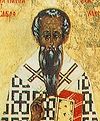

| Previous day | Next day |
| Old Style
July 9
|
Wednesday |
New Style
July 22
|
|
7th Week after Pentecost.
Tone 5.
Fast Day. |
Wine and oil allowed.
|
![]() Hieromartyr Pancratius, bishop of Taormina in Sicily (1st c.).
Hieromartyr Pancratius, bishop of Taormina in Sicily (1st c.).
Hieromartyr Cyril, bishop of Gortyna on Crete (ca. 303). Monkmartyrs Patermuthius and Coprius, and Martyr Alexander the Soldier, of Egypt (361-363). Sts. Patermuthius and Coprius, ascetics, of Egypt (5th c.). St. Theodore, bishop of Edessa (9th c.). Uncovering of the relics of St. Gabriel, archimandrite of St. Elias Skete, Mt. Athos (1994). Hieromartyr Peter, priest, of Cherevkov (Vologda) (early 17th c.).
Hieromartyrs at Wurzburg: Killian, bishop in East Franconia and Thuringia, and his companions Hieromonk Colman and Hierodeacon Totman (689). St. Everild, abbess, of Northumbria (ca. 700). St. Theodosius, stylite, of Edessa (9th c.). St. Photius, founder of Akapniou Monastery in Thessalonica (10th c.). Sts. Dionysius the Rhetorician (1606) and Metrophanes (17th c.), of Little St. Anne’s Skete, Mt. Athos. New Hieromartyr Methodius, bishop of Lappa on Crete (1793).
Repose of Righteous Patermuphy of Valaam and St. Alexander Nevsky Lavra (ca. 1825), Hierodeacon Melchizedek of the Roslavl Forests (1840), and Priest Ilie Lacatusu of Romania (1983).
Thoughts for Each Day of the Year
According to the Daily Church Readings from the Word of God
By St. Theophan the Recluse

Wednesday. [I Cor 7:12-24; Matt. 14:35-15:11]
Not that which goeth into the mouth defileth a man; but that which cometh out of the mouth, this defileth a man. The Lord said this not because He did not favour fasting, or because He considered it not necessary for us—no, both He Himself fasted, and taught the apostles to do so, and He established fasts in his holy Church; but He said this so that we would not only fast by eating little or only uncooked food, but rather so that we would keep the fast in our soul, not indulging it with desires and passionate inclinations. And this is the important thing. Fasting serves as a powerful means for this. The foundation of the passions in the flesh; when the flesh is emaciated, then it is as if a hole is dug under the passions and their fortress is destroyed. Without fasting, overcoming the passions would be a miracle, similar to being in a fire and not being burned. How can he who profusely satisfies his flesh with food, sleep and rest, keep anything spiritual in mind and in his intentions? For him it is as easy to renounce the earth, to contemplate and strive for the invisible world, as would be for an old, decrepit bird to take flight and soar.




